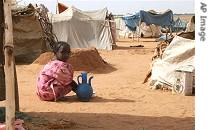2007年VOA标准英语-US Lawmaker, US Envoy Urge Action on Darfur(在线收听)
Capitol Hill
08 February 2007
An influential lawmaker says the United States and its international partners need to plan for possible deployment of a peacekeeping force to protect civilians in Darfur, without the permission of Sudan's government, if diplomacy fails. Congressman Tom Lantos, chairman of the House Committee on Foreign Affairs, made the statement at a hearing where President Bush's envoy for Sudan addressed the humanitarian and military situation on the ground and the issue of U.S. sanctions. VOA's Dan Robinson reports from Capitol Hill:
 |
| Young girl washes plates for her family in North Darfur refugee camp of El Sallam |
However, with Khartoum still resisting a third phase of a plan for deployment of a combined United Nations - African Union force, Congressman Lantos believes there needs to be an alternative plan.
President Bush, he says, should call a summit to discuss effective multilateral sanctions, and the U.S. and its partners should plan for a military force over Khartoum's objections:
"The United States must therefore work with the United Nations, African Union and our allies to prepare a contingency plan for the entry of a protection force into Darfur without the Sudanese government's permission," he said.
Inserting military forces in Darfur unilaterally is not something U.S. defense officials say they are planning. A defense official confirmed that this week to VOA's Pentagon correspondent, saying the focus is on diplomacy.
But U.S. Sudan envoy Andrew Natsios confirmed to the House Foreign Affairs Committee the Bush administration is considering wide-ranging financial and other sanctions aimed at blocking commercial bank transactions by Khartoum, including oil deals.
He declined to give details of what he describes as other sensitive aspects of the plan, but did offer some details about U.S. military observers sent to the Sudan-Chad border as part of a combined U.S. disaster response team assessing the situation there:
"This instability is very dangerous, very dangerous," he noted. "It is also destabilizing the Central African Republic at this point. So we did have military officers there and they did do this assessment and there is going to be a follow-up to the findings for humanitarian purposes, and so let me just leave it at that in terms of the things I can discuss publicly."
Natsios says the humanitarian situation continues to deteriorate, with malnutrition rates in three large refugee camps at emergency levels, above 20 percent, and violence directed at aid organizations:
"And the Janjaweed [Khartoum-supported Arab] militia is paid, directed and equipped by the Sudanese government," he added. "They are out of control in some areas of Darfur."
The U.S. envoy says violence involves not only directed targeting by Arab militias but looting by rebel groups in Darfur, which has created 350,000 internally displaced people since May of 2006.
Natsios says he hopes U.N. envoys Jan Eliasson and Salim Salim can make some headway when they visit Khartoum on the question of a ceasefire, adding that he intends to return to Beijing for more talks with China on Darfur.